Information Management for Supply Chains: Addicon Logistics
VerifiedAdded on 2020/03/07
|8
|1140
|89
Report
AI Summary
This report examines the application of various information systems to improve supply chain management within Addicon Logistics. It analyzes the benefits of Customer Relationship Management (CRM), Supplier Relationship Management (SRM), Enterprise Resource Planning (ERP), Global Positioning System (GPS), Geographic Information System (GIS), and Radio Frequency Identification (RFID) systems. The report highlights how these systems can address challenges related to manpower allocation, enhance operational efficiency, and improve overall supply chain performance. It explores how each system contributes to better tracking, communication, inventory management, and decision-making, ultimately leading to improved customer satisfaction and optimized logistics processes. The report concludes that the integrated deployment of these information systems is crucial for resolving operational issues and achieving a more streamlined and effective supply chain.
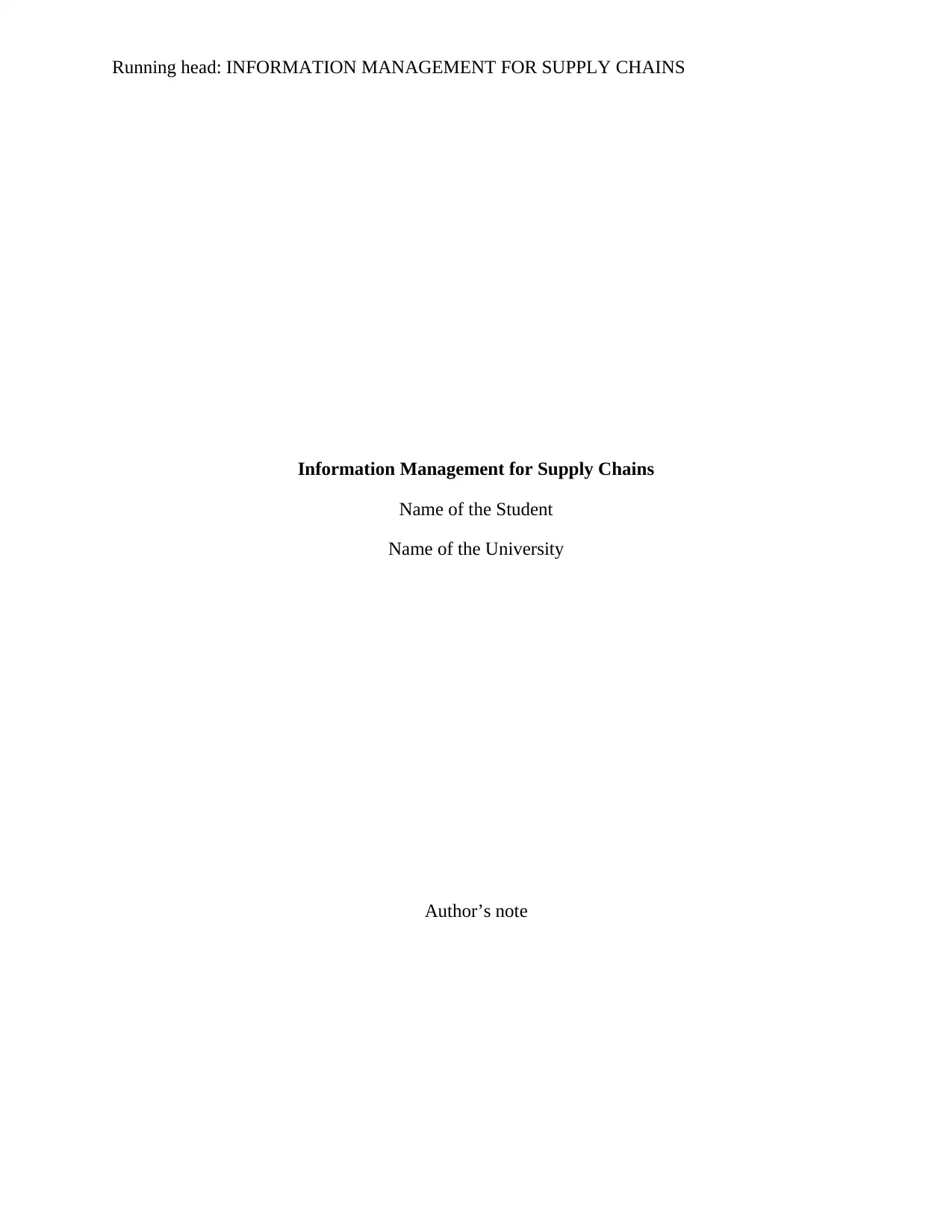
Running head: INFORMATION MANAGEMENT FOR SUPPLY CHAINS
Information Management for Supply Chains
Name of the Student
Name of the University
Author’s note
Information Management for Supply Chains
Name of the Student
Name of the University
Author’s note
Paraphrase This Document
Need a fresh take? Get an instant paraphrase of this document with our AI Paraphraser
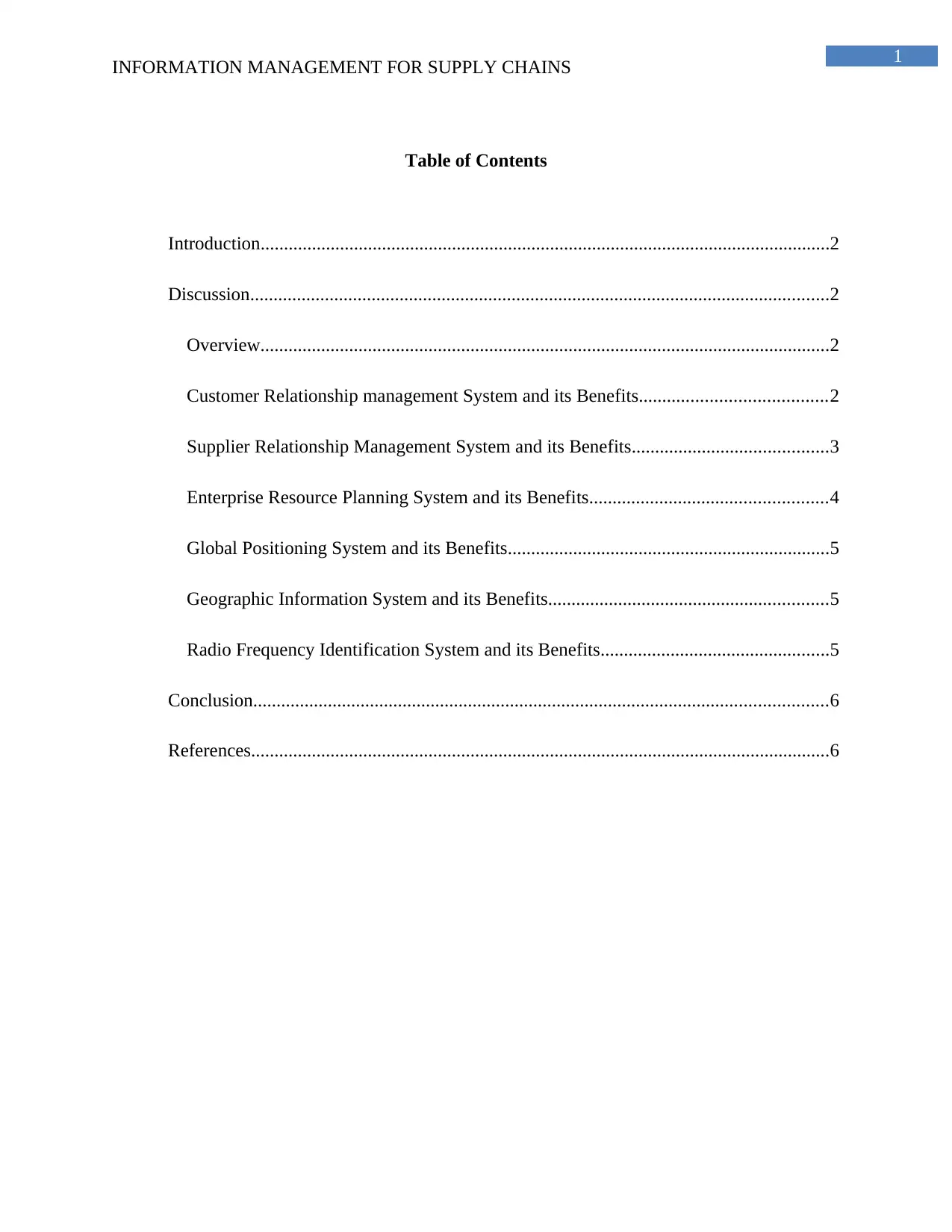
1
INFORMATION MANAGEMENT FOR SUPPLY CHAINS
Table of Contents
Introduction..........................................................................................................................2
Discussion............................................................................................................................2
Overview..........................................................................................................................2
Customer Relationship management System and its Benefits........................................2
Supplier Relationship Management System and its Benefits..........................................3
Enterprise Resource Planning System and its Benefits...................................................4
Global Positioning System and its Benefits.....................................................................5
Geographic Information System and its Benefits............................................................5
Radio Frequency Identification System and its Benefits.................................................5
Conclusion...........................................................................................................................6
References............................................................................................................................6
INFORMATION MANAGEMENT FOR SUPPLY CHAINS
Table of Contents
Introduction..........................................................................................................................2
Discussion............................................................................................................................2
Overview..........................................................................................................................2
Customer Relationship management System and its Benefits........................................2
Supplier Relationship Management System and its Benefits..........................................3
Enterprise Resource Planning System and its Benefits...................................................4
Global Positioning System and its Benefits.....................................................................5
Geographic Information System and its Benefits............................................................5
Radio Frequency Identification System and its Benefits.................................................5
Conclusion...........................................................................................................................6
References............................................................................................................................6
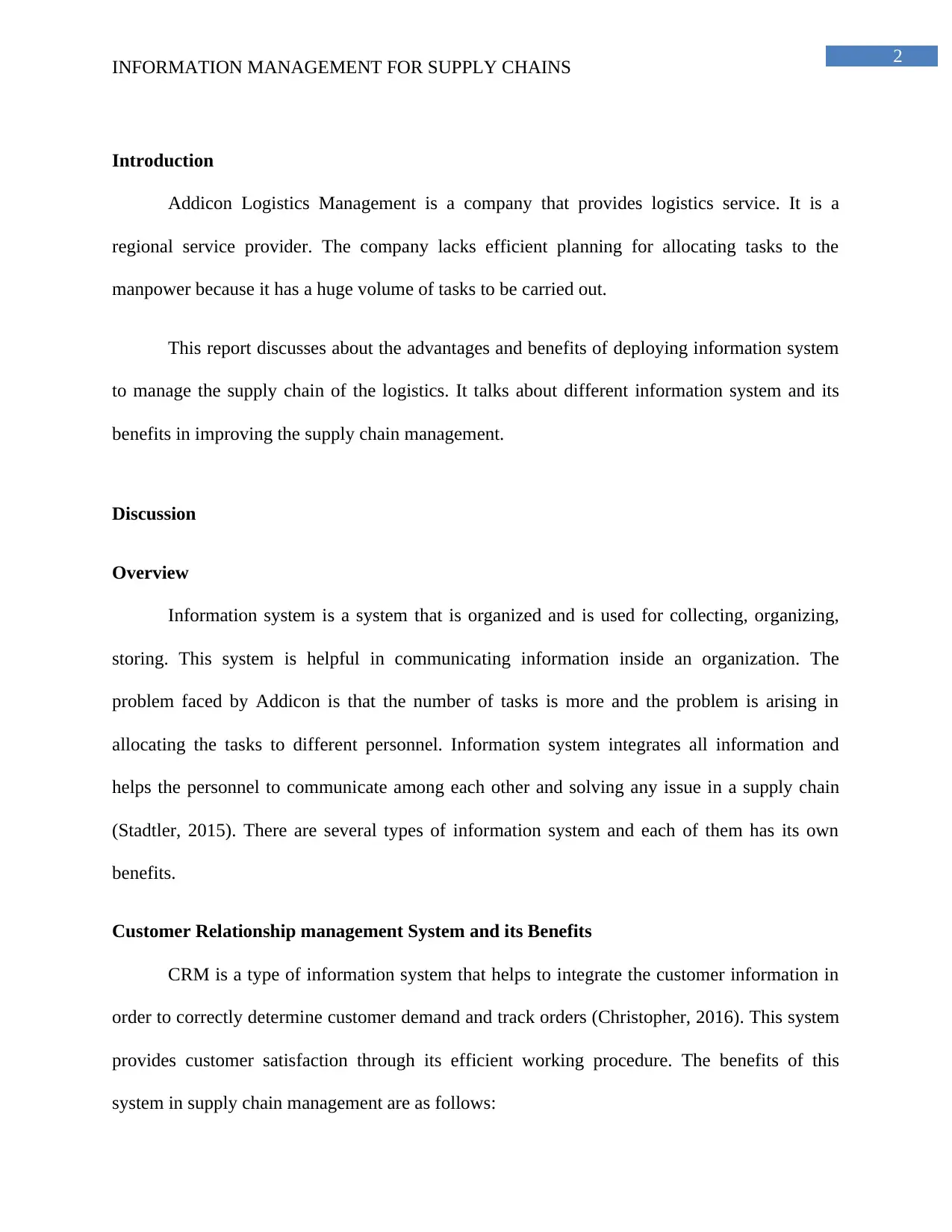
2
INFORMATION MANAGEMENT FOR SUPPLY CHAINS
Introduction
Addicon Logistics Management is a company that provides logistics service. It is a
regional service provider. The company lacks efficient planning for allocating tasks to the
manpower because it has a huge volume of tasks to be carried out.
This report discusses about the advantages and benefits of deploying information system
to manage the supply chain of the logistics. It talks about different information system and its
benefits in improving the supply chain management.
Discussion
Overview
Information system is a system that is organized and is used for collecting, organizing,
storing. This system is helpful in communicating information inside an organization. The
problem faced by Addicon is that the number of tasks is more and the problem is arising in
allocating the tasks to different personnel. Information system integrates all information and
helps the personnel to communicate among each other and solving any issue in a supply chain
(Stadtler, 2015). There are several types of information system and each of them has its own
benefits.
Customer Relationship management System and its Benefits
CRM is a type of information system that helps to integrate the customer information in
order to correctly determine customer demand and track orders (Christopher, 2016). This system
provides customer satisfaction through its efficient working procedure. The benefits of this
system in supply chain management are as follows:
INFORMATION MANAGEMENT FOR SUPPLY CHAINS
Introduction
Addicon Logistics Management is a company that provides logistics service. It is a
regional service provider. The company lacks efficient planning for allocating tasks to the
manpower because it has a huge volume of tasks to be carried out.
This report discusses about the advantages and benefits of deploying information system
to manage the supply chain of the logistics. It talks about different information system and its
benefits in improving the supply chain management.
Discussion
Overview
Information system is a system that is organized and is used for collecting, organizing,
storing. This system is helpful in communicating information inside an organization. The
problem faced by Addicon is that the number of tasks is more and the problem is arising in
allocating the tasks to different personnel. Information system integrates all information and
helps the personnel to communicate among each other and solving any issue in a supply chain
(Stadtler, 2015). There are several types of information system and each of them has its own
benefits.
Customer Relationship management System and its Benefits
CRM is a type of information system that helps to integrate the customer information in
order to correctly determine customer demand and track orders (Christopher, 2016). This system
provides customer satisfaction through its efficient working procedure. The benefits of this
system in supply chain management are as follows:
⊘ This is a preview!⊘
Do you want full access?
Subscribe today to unlock all pages.

Trusted by 1+ million students worldwide
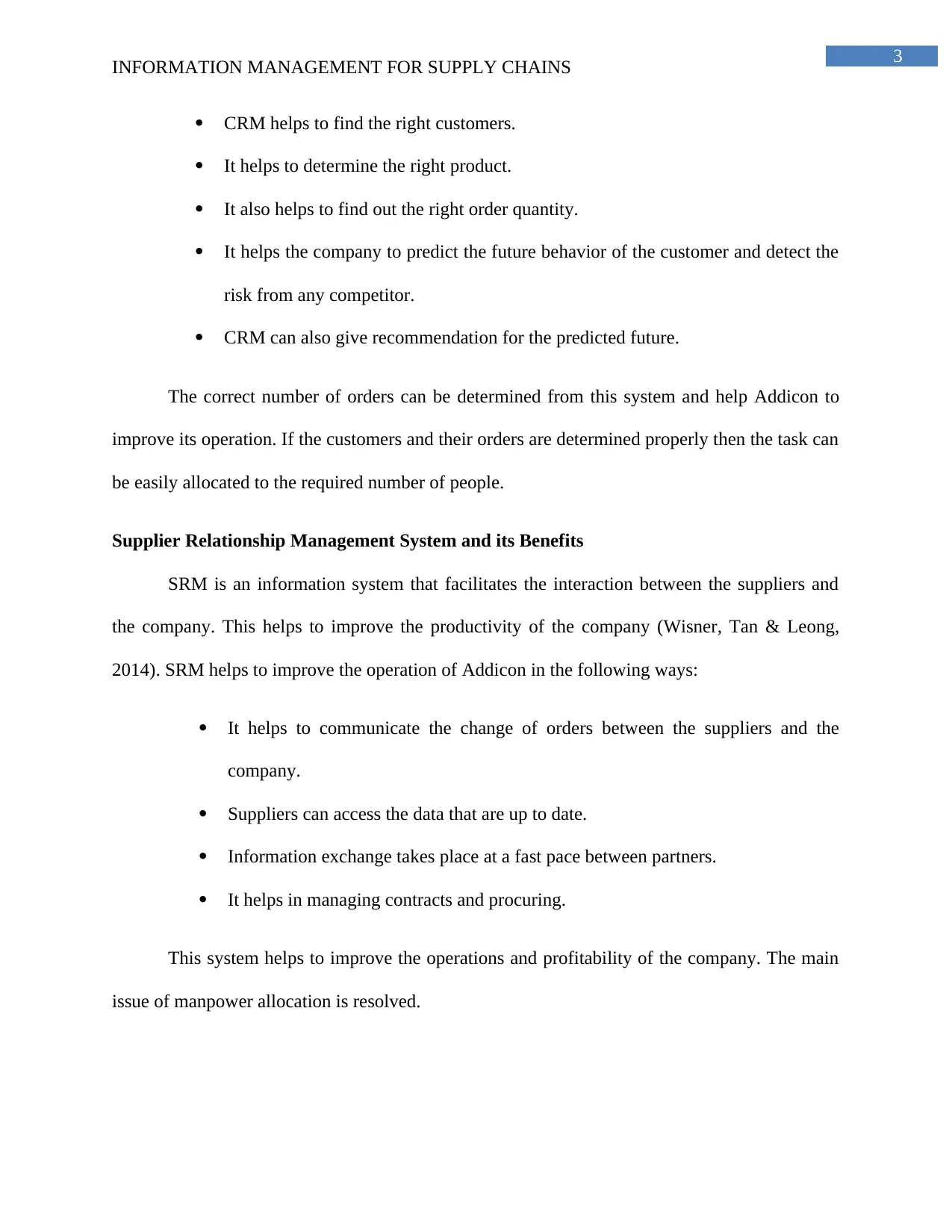
3
INFORMATION MANAGEMENT FOR SUPPLY CHAINS
CRM helps to find the right customers.
It helps to determine the right product.
It also helps to find out the right order quantity.
It helps the company to predict the future behavior of the customer and detect the
risk from any competitor.
CRM can also give recommendation for the predicted future.
The correct number of orders can be determined from this system and help Addicon to
improve its operation. If the customers and their orders are determined properly then the task can
be easily allocated to the required number of people.
Supplier Relationship Management System and its Benefits
SRM is an information system that facilitates the interaction between the suppliers and
the company. This helps to improve the productivity of the company (Wisner, Tan & Leong,
2014). SRM helps to improve the operation of Addicon in the following ways:
It helps to communicate the change of orders between the suppliers and the
company.
Suppliers can access the data that are up to date.
Information exchange takes place at a fast pace between partners.
It helps in managing contracts and procuring.
This system helps to improve the operations and profitability of the company. The main
issue of manpower allocation is resolved.
INFORMATION MANAGEMENT FOR SUPPLY CHAINS
CRM helps to find the right customers.
It helps to determine the right product.
It also helps to find out the right order quantity.
It helps the company to predict the future behavior of the customer and detect the
risk from any competitor.
CRM can also give recommendation for the predicted future.
The correct number of orders can be determined from this system and help Addicon to
improve its operation. If the customers and their orders are determined properly then the task can
be easily allocated to the required number of people.
Supplier Relationship Management System and its Benefits
SRM is an information system that facilitates the interaction between the suppliers and
the company. This helps to improve the productivity of the company (Wisner, Tan & Leong,
2014). SRM helps to improve the operation of Addicon in the following ways:
It helps to communicate the change of orders between the suppliers and the
company.
Suppliers can access the data that are up to date.
Information exchange takes place at a fast pace between partners.
It helps in managing contracts and procuring.
This system helps to improve the operations and profitability of the company. The main
issue of manpower allocation is resolved.
Paraphrase This Document
Need a fresh take? Get an instant paraphrase of this document with our AI Paraphraser
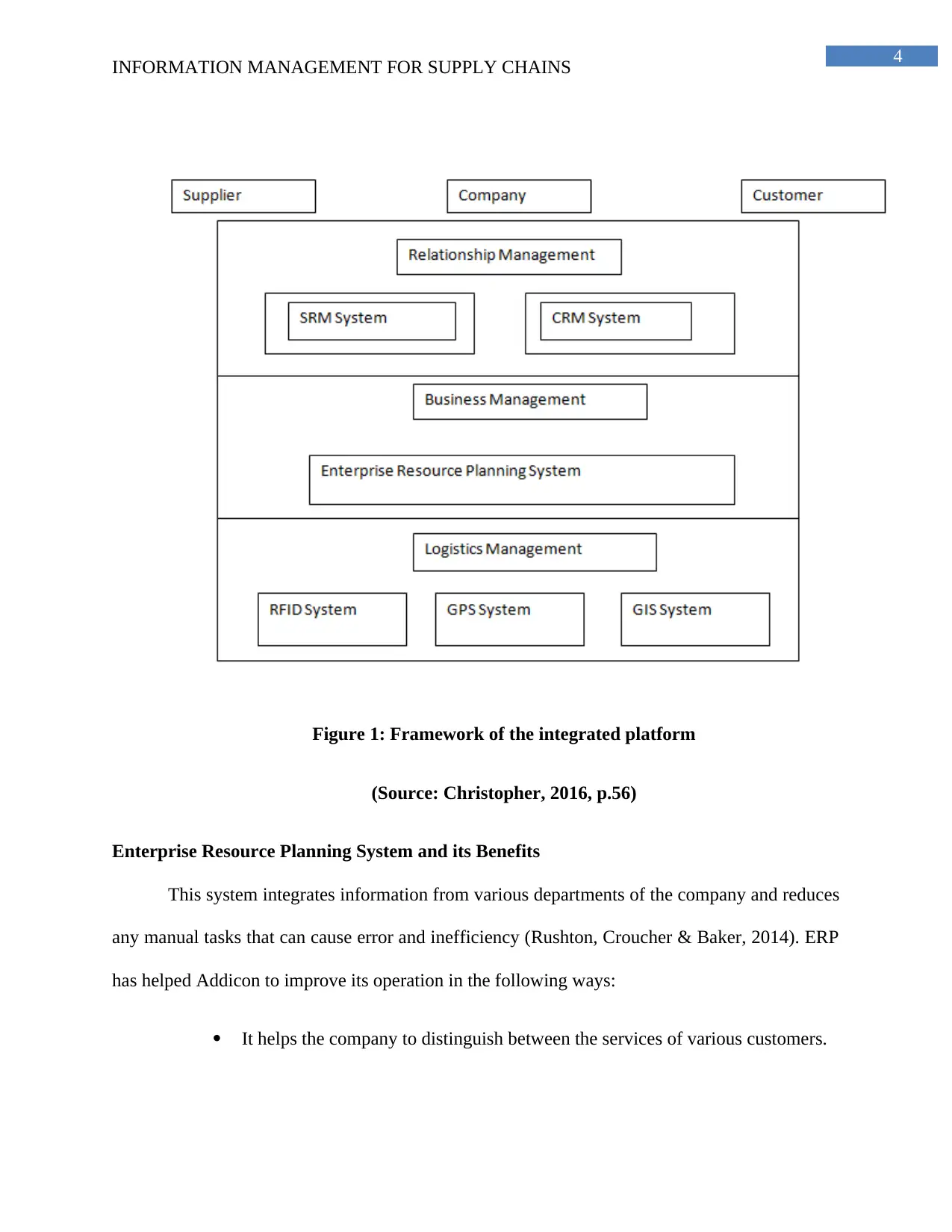
4
INFORMATION MANAGEMENT FOR SUPPLY CHAINS
Figure 1: Framework of the integrated platform
(Source: Christopher, 2016, p.56)
Enterprise Resource Planning System and its Benefits
This system integrates information from various departments of the company and reduces
any manual tasks that can cause error and inefficiency (Rushton, Croucher & Baker, 2014). ERP
has helped Addicon to improve its operation in the following ways:
It helps the company to distinguish between the services of various customers.
INFORMATION MANAGEMENT FOR SUPPLY CHAINS
Figure 1: Framework of the integrated platform
(Source: Christopher, 2016, p.56)
Enterprise Resource Planning System and its Benefits
This system integrates information from various departments of the company and reduces
any manual tasks that can cause error and inefficiency (Rushton, Croucher & Baker, 2014). ERP
has helped Addicon to improve its operation in the following ways:
It helps the company to distinguish between the services of various customers.
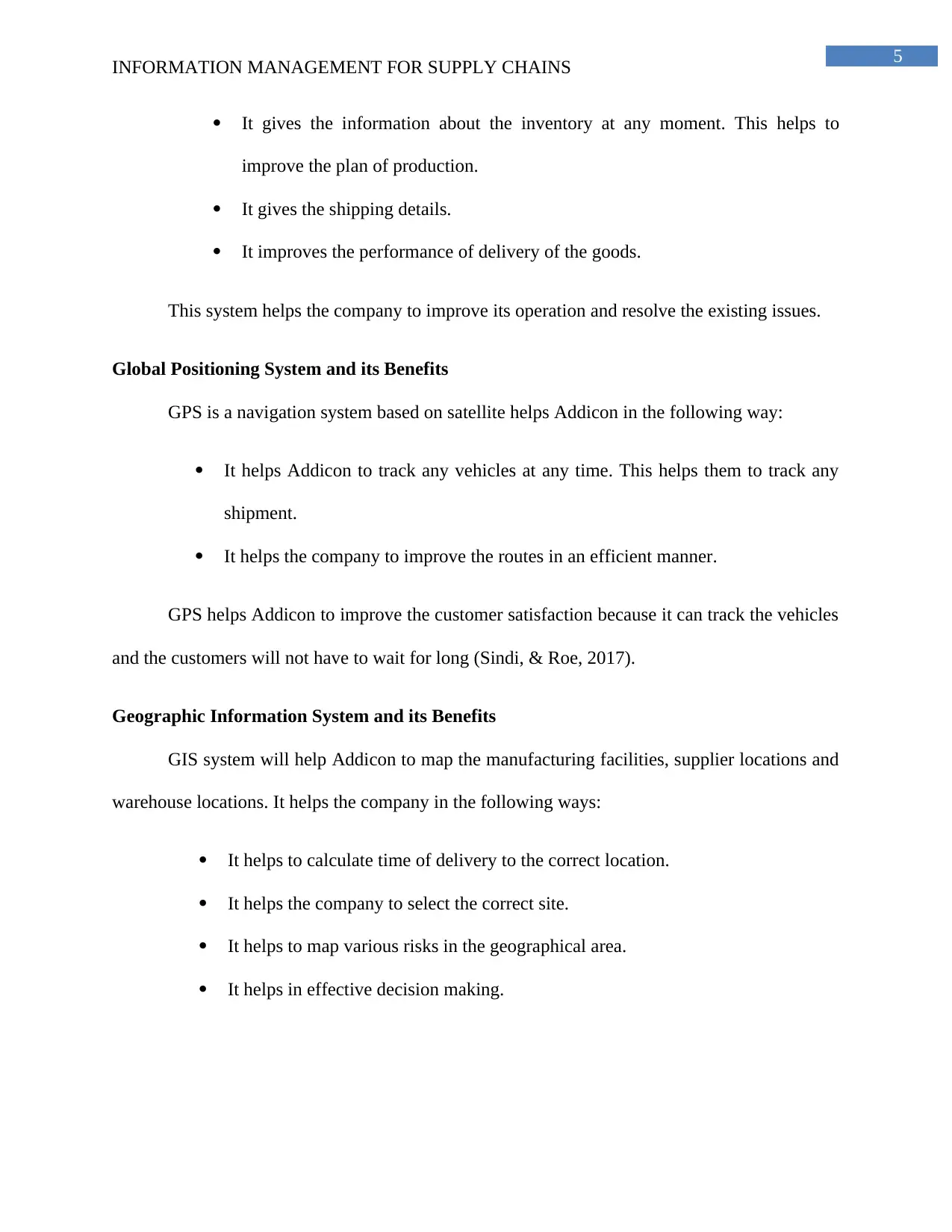
5
INFORMATION MANAGEMENT FOR SUPPLY CHAINS
It gives the information about the inventory at any moment. This helps to
improve the plan of production.
It gives the shipping details.
It improves the performance of delivery of the goods.
This system helps the company to improve its operation and resolve the existing issues.
Global Positioning System and its Benefits
GPS is a navigation system based on satellite helps Addicon in the following way:
It helps Addicon to track any vehicles at any time. This helps them to track any
shipment.
It helps the company to improve the routes in an efficient manner.
GPS helps Addicon to improve the customer satisfaction because it can track the vehicles
and the customers will not have to wait for long (Sindi, & Roe, 2017).
Geographic Information System and its Benefits
GIS system will help Addicon to map the manufacturing facilities, supplier locations and
warehouse locations. It helps the company in the following ways:
It helps to calculate time of delivery to the correct location.
It helps the company to select the correct site.
It helps to map various risks in the geographical area.
It helps in effective decision making.
INFORMATION MANAGEMENT FOR SUPPLY CHAINS
It gives the information about the inventory at any moment. This helps to
improve the plan of production.
It gives the shipping details.
It improves the performance of delivery of the goods.
This system helps the company to improve its operation and resolve the existing issues.
Global Positioning System and its Benefits
GPS is a navigation system based on satellite helps Addicon in the following way:
It helps Addicon to track any vehicles at any time. This helps them to track any
shipment.
It helps the company to improve the routes in an efficient manner.
GPS helps Addicon to improve the customer satisfaction because it can track the vehicles
and the customers will not have to wait for long (Sindi, & Roe, 2017).
Geographic Information System and its Benefits
GIS system will help Addicon to map the manufacturing facilities, supplier locations and
warehouse locations. It helps the company in the following ways:
It helps to calculate time of delivery to the correct location.
It helps the company to select the correct site.
It helps to map various risks in the geographical area.
It helps in effective decision making.
⊘ This is a preview!⊘
Do you want full access?
Subscribe today to unlock all pages.

Trusted by 1+ million students worldwide
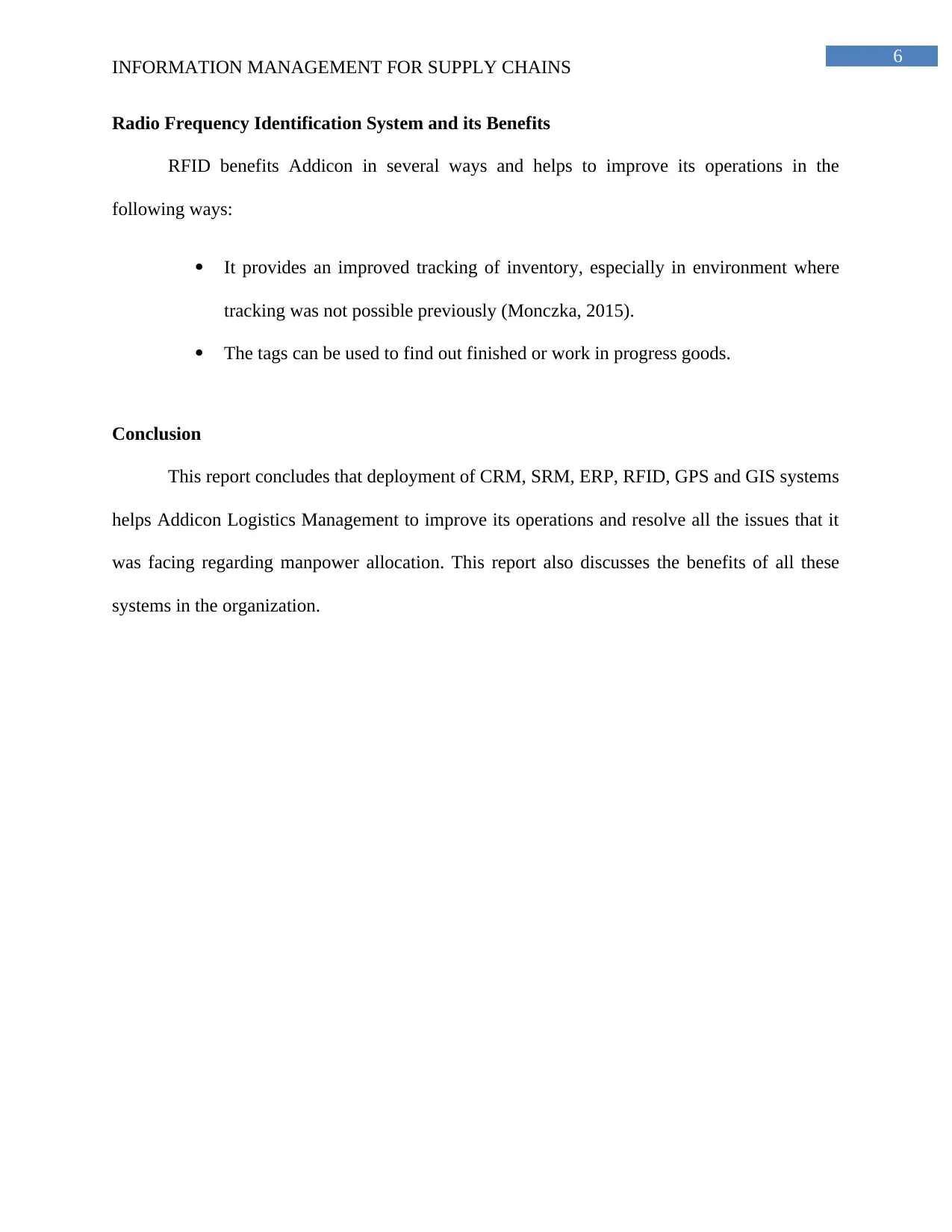
6
INFORMATION MANAGEMENT FOR SUPPLY CHAINS
Radio Frequency Identification System and its Benefits
RFID benefits Addicon in several ways and helps to improve its operations in the
following ways:
It provides an improved tracking of inventory, especially in environment where
tracking was not possible previously (Monczka, 2015).
The tags can be used to find out finished or work in progress goods.
Conclusion
This report concludes that deployment of CRM, SRM, ERP, RFID, GPS and GIS systems
helps Addicon Logistics Management to improve its operations and resolve all the issues that it
was facing regarding manpower allocation. This report also discusses the benefits of all these
systems in the organization.
INFORMATION MANAGEMENT FOR SUPPLY CHAINS
Radio Frequency Identification System and its Benefits
RFID benefits Addicon in several ways and helps to improve its operations in the
following ways:
It provides an improved tracking of inventory, especially in environment where
tracking was not possible previously (Monczka, 2015).
The tags can be used to find out finished or work in progress goods.
Conclusion
This report concludes that deployment of CRM, SRM, ERP, RFID, GPS and GIS systems
helps Addicon Logistics Management to improve its operations and resolve all the issues that it
was facing regarding manpower allocation. This report also discusses the benefits of all these
systems in the organization.
Paraphrase This Document
Need a fresh take? Get an instant paraphrase of this document with our AI Paraphraser
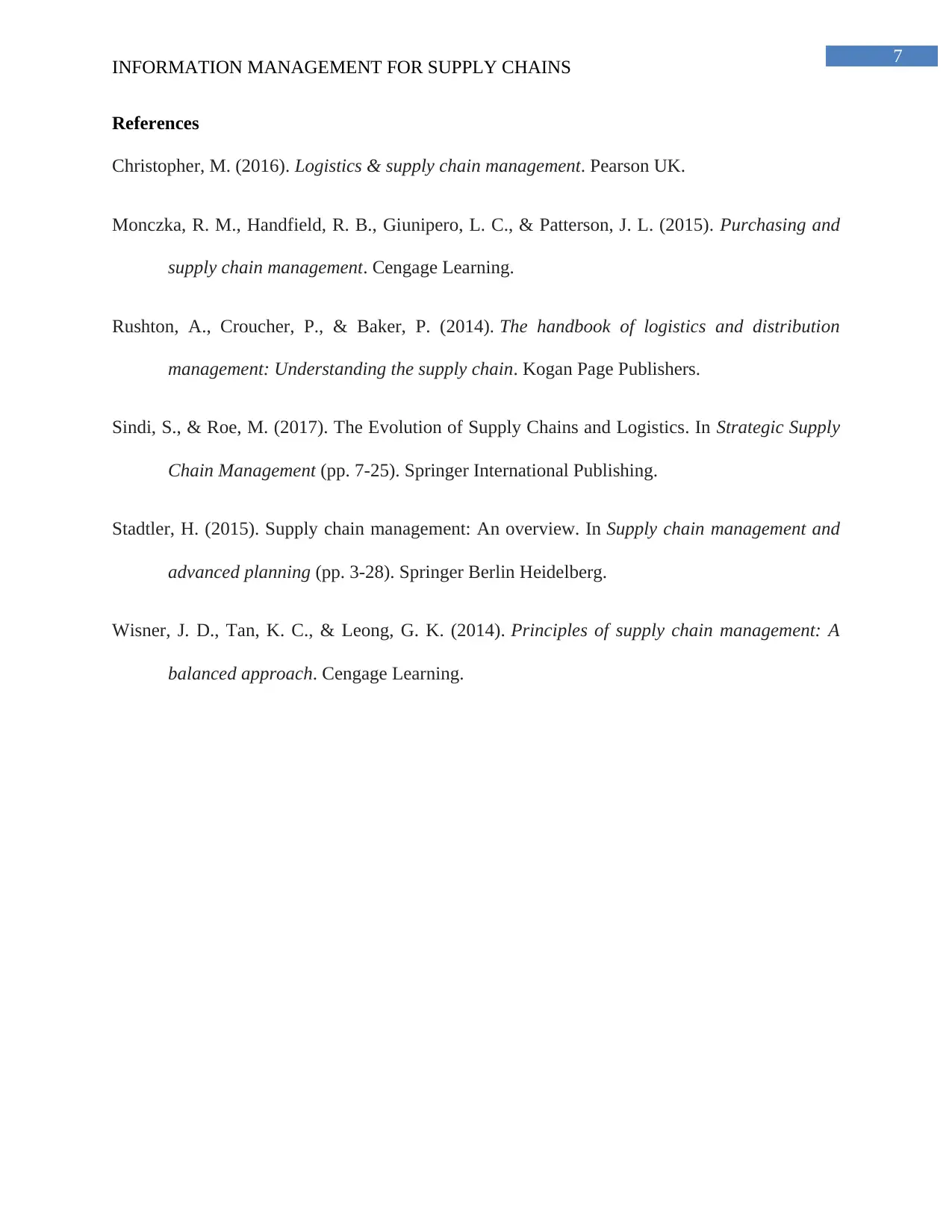
7
INFORMATION MANAGEMENT FOR SUPPLY CHAINS
References
Christopher, M. (2016). Logistics & supply chain management. Pearson UK.
Monczka, R. M., Handfield, R. B., Giunipero, L. C., & Patterson, J. L. (2015). Purchasing and
supply chain management. Cengage Learning.
Rushton, A., Croucher, P., & Baker, P. (2014). The handbook of logistics and distribution
management: Understanding the supply chain. Kogan Page Publishers.
Sindi, S., & Roe, M. (2017). The Evolution of Supply Chains and Logistics. In Strategic Supply
Chain Management (pp. 7-25). Springer International Publishing.
Stadtler, H. (2015). Supply chain management: An overview. In Supply chain management and
advanced planning (pp. 3-28). Springer Berlin Heidelberg.
Wisner, J. D., Tan, K. C., & Leong, G. K. (2014). Principles of supply chain management: A
balanced approach. Cengage Learning.
INFORMATION MANAGEMENT FOR SUPPLY CHAINS
References
Christopher, M. (2016). Logistics & supply chain management. Pearson UK.
Monczka, R. M., Handfield, R. B., Giunipero, L. C., & Patterson, J. L. (2015). Purchasing and
supply chain management. Cengage Learning.
Rushton, A., Croucher, P., & Baker, P. (2014). The handbook of logistics and distribution
management: Understanding the supply chain. Kogan Page Publishers.
Sindi, S., & Roe, M. (2017). The Evolution of Supply Chains and Logistics. In Strategic Supply
Chain Management (pp. 7-25). Springer International Publishing.
Stadtler, H. (2015). Supply chain management: An overview. In Supply chain management and
advanced planning (pp. 3-28). Springer Berlin Heidelberg.
Wisner, J. D., Tan, K. C., & Leong, G. K. (2014). Principles of supply chain management: A
balanced approach. Cengage Learning.
1 out of 8
Related Documents
Your All-in-One AI-Powered Toolkit for Academic Success.
+13062052269
info@desklib.com
Available 24*7 on WhatsApp / Email
![[object Object]](/_next/static/media/star-bottom.7253800d.svg)
Unlock your academic potential
Copyright © 2020–2026 A2Z Services. All Rights Reserved. Developed and managed by ZUCOL.





